☆ PuniPuni Youtube ☆
Japanese Vocabulary: Family – Review Notes
Today we learned some basic family vocabulary in Japanese! Let’s go over what we learned today and then we will see a list of extra Japanese family vocabulary.
………………………………………………………………………………..
Number 1:

★ 家族 (kazoku) means family in Japanese.
★ A formal way to say family when talking about someone else’s family is ご家族 (gokazoku).
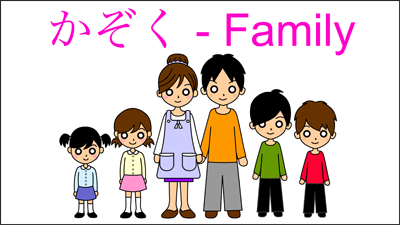
………………………………………………………………………………..
Example 1:
あなたのご家族は何人家族ですか?
Anata no gokazoku wa nannin kazoku desu ka?
How many members are there in your family?
………………………………………………………………………………..
Example 2:
私の家族は六人家族です。
Watashi no kazoku wa rokunin kazoku desu.
My family is a six-person family.
………………………………………………………………………………..
Number 2:
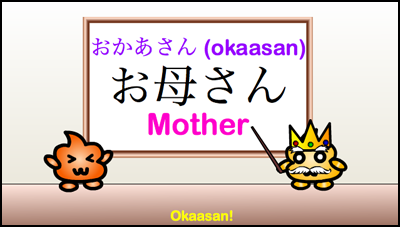
★ Mother in Japanese is お母さん (okaasan)!
★ When talking about your mother to other people in formal speech you should use 母 (haha) instead.
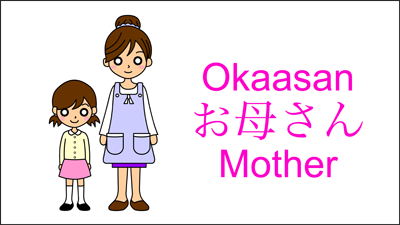
………………………………………………………………………………..
Example 1:
あなたのお母さんはどんな人ですか。
Anata no okaasan wa donna hito desu ka?
What kind of a person is your mother?
………………………………………………………………………………..
Example 2:
私の母はとても優しい人です。
Watashi no haha wa totemo yasashii hito desu.
My mother is a very kind person.
………………………………………………………………………………..
Number 3:
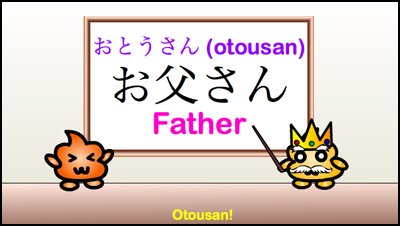
★ The Japanese word for father is お父さん (otousan).
★ When talking about your father to other people in formal speech you should use 父 (chichi) instead.
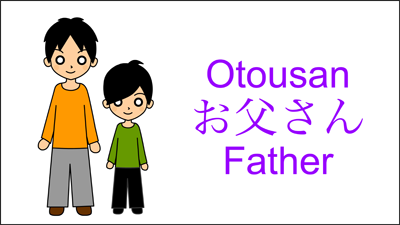
………………………………………………………………………………..
Example 1:
あなたのお父さんはどんな人ですか。
Anata no otousan wa donna hito desu ka?
What kind of a person is your father?
………………………………………………………………………………..
Example 2:
私の父はまじめな人です。
Watashi no chichi wa majime na hito desu.
My father is a serious person.
………………………………………………………………………………..
Number 4:
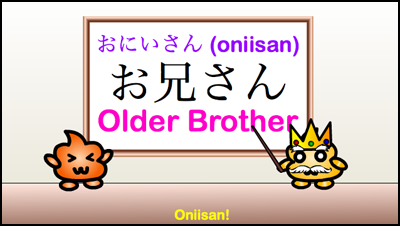
★ The Japanese word for older brother is お兄さん (oniisan).
★ When talking about your older brother to other people in formal speech, you should use 兄 (ani) instead.
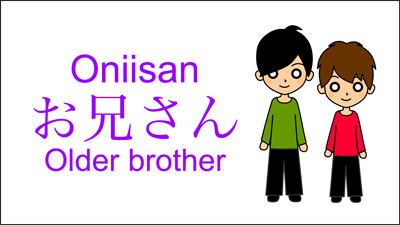
………………………………………………………………………………..
Example 1:
あなたのお兄さんは何歳ですか。
Anata no oniichan wa nansai desu ka?
How old is your older brother?
………………………………………………………………………………..
Example 2:
私の兄は二十五歳です。
Watashi no ani wa nijūgosai desu.
My older brother is 25 years old.
………………………………………………………………………………..
Number 5:
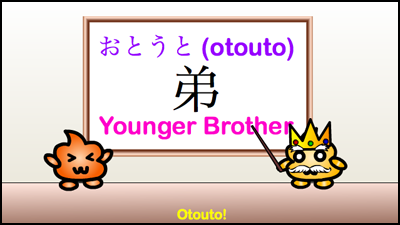
★ The Japanese word for younger brother is 弟 (otouto).
★ When talking about someone else’s younger brother in formal speech, you should say 弟さん (otoutosan).
★ People usually do not address their younger brother with this word. Instead, they just use their name.
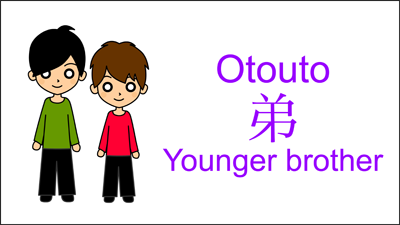
………………………………………………………………………………..
Example 1:
弟さんは何歳ですか。
Otoutosan wa nansai desu ka?
How old is your younger brother?
………………………………………………………………………………..
Example 2:
僕の弟は五歳です。
Boku no otouto wa gosai desu.
My younger brother is 5 years old.
………………………………………………………………………………..
Number 6:
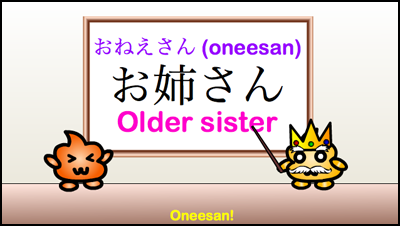
★ The Japanese word for older sister is お姉さん (oneesan).
★ When talking about your older sister to other people in formal speech you should use 姉 (ane) instead.
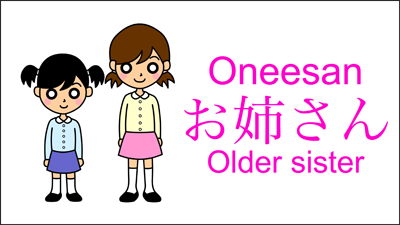
………………………………………………………………………………..
Example 1:
あなたのお姉さんは大学生ですか。
Anata no oneesan wa daigakusei desu ka?
Is your older sister a college student?
………………………………………………………………………………..
Example 2:
私の姉は高校生です。
Watashi no ane wa koukousei desu.
My older sister is a high school student.
………………………………………………………………………………..
Number 7:
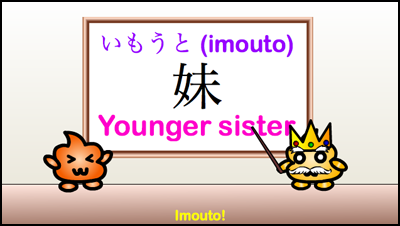
★ The Japanese word for younger sister is 妹 (imouto).
★ When talking about someone else’s younger sister in formal speech, you should say 妹さん (imoutosan).
★ People usually do not address their younger sister with this word. Instead, they just use their name.
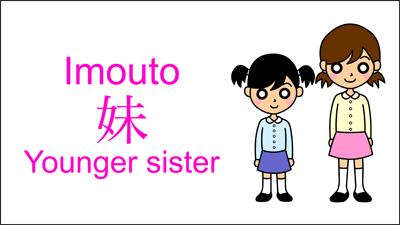
………………………………………………………………………………..
Example 1:
妹さんは小学生ですか。
Imoutosan wa shougakusei desu ka?
Is your little sister an elementary school student?
………………………………………………………………………………..
Example 2:
私の妹は中学生です。
Watashi no imouto wa chuugakusei desu.
My little sister is a junior high school student.
………………………………………………………………………………..
More Family Vocabulary:
兄弟 kyoudai brothers/siblings
姉妹 shimai sisters
双子 futago twins
息子 musuko son
娘 musume daughter
姪 mei niece
甥 oi nephew
叔母 oba aunt
叔父 oji uncle
いとこ itoko cousin
おじいさん ojiisan grandpa
おばあさん obaasan grandma
……………………………………………………………………………….
Conclusion:
We learned a lot of Japanese family vocabulary today! If you have any questions about how to use these words or if you want to know any other family vocabulary that we have not listed, leave a comment below!
……………………………………………………………………………….
Do you want a Japanese tutor?
Take Japanese Skype Lessons with Professional Japanese Teachers on kakehashijapan.com!
………………………………………………………………………………..
………………………………………………………………………………..







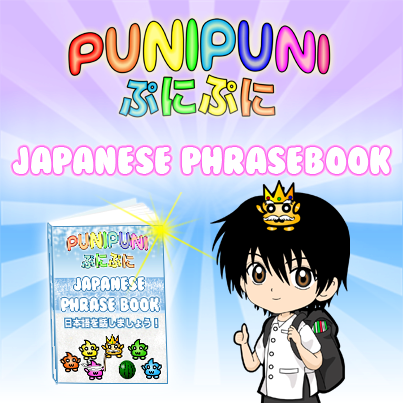

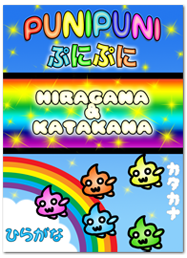
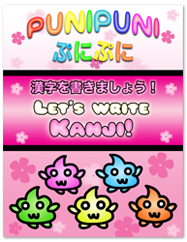


10 comments
The can honorific could be used with any of these right? I could say obachan and okaachan?
Comment by MyMy on 01/06/2013 at 12:28 amはい!そうです。Yes, that is right \(◕ω◕)/♥
Comment by PuniPuni on 01/06/2013 at 12:43 amI want to write a letter to the host family that took care of me wile i was in Japan. In Japanese how do i adress a letter to the host family as a whole. Would it be something like imaura san tachi? I want to express, to the imaura family or dear imaura family, so i can write mail. ;0
Comment by crittle on 03/25/2013 at 3:27 amYou can say: 今浦家のみなさんへ (Imaura ke no minasan e) (◕ω◕)♪
Comment by PuniPuni on 03/25/2013 at 9:18 amWould “Onee-chan” also be a way to say sister in japanese?
Comment by Lucy on 06/04/2013 at 7:00 pmyes \(◕ω<)/♪ It is another way to say "older sister" in Japanese!
Comment by PuniPuni on 06/05/2013 at 7:04 pmKnew that was right… Arigato! ^^
Comment by Lucy on 06/24/2013 at 6:59 pmit’s so helpful.. arigatou gozaimasu.
Comment by angelique on 08/28/2013 at 4:29 amhow can I say boy’s mother in Japanese?
Comment by MayuChan on 02/12/2014 at 5:18 am“Boy’s mother” is 男の子のお母さん (otoko no ko no okaasan). 男の子 (otoko no ko) means “boy” and お母さん (okaasan) means “mother.” The particle の (no) connecting the two is like the ‘s in English. (◕ω<)♥ More information here: http://www.punipunijapan.com/grammar-lesson-3-particle-%E3%81%AE-no/
Comment by PuniPuni on 02/14/2014 at 6:44 pm